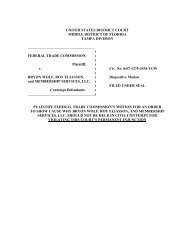Gasoline Price Changes - Federal Trade Commission
Gasoline Price Changes - Federal Trade Commission
Gasoline Price Changes - Federal Trade Commission
Create successful ePaper yourself
Turn your PDF publications into a flip-book with our unique Google optimized e-Paper software.
EXECUTIVE SUMMARY<br />
Many people who purchased gasoline in the U.S. in the past week likely could report the<br />
price paid per gallon. Consumers closely follow gasoline prices, and with good reason. U.S.<br />
consumers have experienced dramatic increases and wide fluctuations in gasoline prices over the<br />
past several years. During 2004 and 2005, U.S. consumers spent millions of dollars more on<br />
gasoline than they had anticipated. In the spring of 2005, the national weekly average price of<br />
gasoline at the pump, including taxes, rose as high as $2.28 per gallon. Steep, but temporary,<br />
gasoline price spikes have occurred in various areas throughout the U.S. Since the mid-1990s,<br />
consumers on the West Coast, especially in California, have observed that their gasoline prices<br />
are usually higher than elsewhere in the U.S.<br />
Rising average gasoline prices and gasoline price spikes command our attention. What<br />
causes high gasoline prices like those of 2004 and 2005? What causes gasoline price spikes?<br />
These important questions require a thorough and accurate analysis of the factors – supply,<br />
demand, and competition, as well as federal, state, and local regulations – that drive gasoline<br />
prices, so that policymakers can evaluate and choose strategies likely to succeed in addressing<br />
high gasoline prices.<br />
This Report provides such an analysis, drawing upon what the <strong>Federal</strong> <strong>Trade</strong><br />
<strong>Commission</strong> (FTC) has learned about the factors that can influence average gasoline prices or<br />
cause gasoline price spikes. Over the past 30 years, the FTC has investigated nearly all oilrelated<br />
antitrust matters and has held public hearings, undertaken empirical economic studies,<br />
and prepared extensive reports on oil-related issues, such as the Midwest gasoline price spike in<br />
June 2000. Since 2002, the staff of the FTC has monitored weekly average retail gasoline and<br />
diesel prices in 360 cities nationwide to find and, if necessary, recommend appropriate action on<br />
pricing anomalies that might indicate anticompetitive conduct.<br />
Some observers suggest that oil company collusion, anticompetitive mergers, or other<br />
anticompetitive conduct – not market forces – may be the primary cause of higher gasoline<br />
prices. Anticompetitive conduct is always a possibility, of course. That is the reason for the<br />
antitrust laws. The FTC has been and remains vigilant regarding anticompetitive conduct in this<br />
industry. The FTC has taken action against proposed mergers in this industry at concentration<br />
levels lower than in other industries. Since 1981, the FTC has investigated 16 large petroleum<br />
mergers. In 12 of these cases, the FTC obtained significant divestitures and in the four other<br />
cases, the parties abandoned the transactions altogether after antitrust challenge. In 2004, the<br />
FTC staff published a study reviewing the petroleum industry’s mergers and structural changes<br />
as well as the antitrust enforcement actions the FTC has taken. 1 In no other industry does the<br />
FTC maintain a price monitoring project such as its project to monitor retail gasoline and diesel<br />
prices. Most recently, on June 10, 2005, the FTC announced the acceptance of two consent<br />
orders that resolved the competitive concerns relating to Chevron’s acquisition of Unocal and<br />
settled the FTC’s 2003 monopolization complaint against Unocal. The Unocal settlement alone<br />
has the potential of saving consumers nationwide billions of dollars in future years. 2
















